Turning Martian air, dirt and sunlight into iron
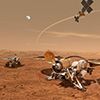 Scientists have published the first detailed study of its kind on metal production on another planet.
Scientists have published the first detailed study of its kind on metal production on another planet.
Aug 5th, 2022
Read more
 Subscribe to our Space Exploration News feed
Subscribe to our Space Exploration News feed
 Scientists have published the first detailed study of its kind on metal production on another planet.
Scientists have published the first detailed study of its kind on metal production on another planet.
Aug 5th, 2022
Read more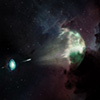 Scientists have for the first time recorded millimeter-wavelength light from a fiery explosion caused by the merger of a neutron star with another star. The team also confirmed this flash of light to be one of the most energetic short-duration gamma-ray bursts ever observed.
Scientists have for the first time recorded millimeter-wavelength light from a fiery explosion caused by the merger of a neutron star with another star. The team also confirmed this flash of light to be one of the most energetic short-duration gamma-ray bursts ever observed.
Aug 3rd, 2022
Read more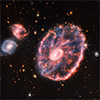 The James Webb Space Telescope has peered into the chaos of the Cartwheel Galaxy, revealing new details about star formation and the galaxy's central black hole.
The James Webb Space Telescope has peered into the chaos of the Cartwheel Galaxy, revealing new details about star formation and the galaxy's central black hole.
Aug 2nd, 2022
Read more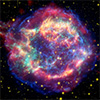 Ion probe studies and improved stellar nucleosynthesis models are providing new insights into our solar system's stardust.
Ion probe studies and improved stellar nucleosynthesis models are providing new insights into our solar system's stardust.
Aug 2nd, 2022
Read more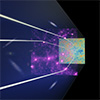 New findings offer the tantalizing possibility that the fundamental rules of cosmology may differ when examining the early history of our universe.
New findings offer the tantalizing possibility that the fundamental rules of cosmology may differ when examining the early history of our universe.
Aug 1st, 2022
Read more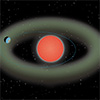 A super-Earth planet has been found near the habitable zone of a red dwarf star only 37 light-years from the Earth. This is the first discovery by a new instrument on the Subaru Telescope and offers a chance to investigate the possibility of life on planets around nearby stars.
A super-Earth planet has been found near the habitable zone of a red dwarf star only 37 light-years from the Earth. This is the first discovery by a new instrument on the Subaru Telescope and offers a chance to investigate the possibility of life on planets around nearby stars.
Aug 1st, 2022
Read more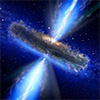 Research uses X-ray telescopes and a new data analysis technique to describe space objects.
Research uses X-ray telescopes and a new data analysis technique to describe space objects.
Jul 26th, 2022
Read more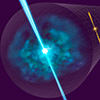 Researchers analyzed archive data for powerful cosmic explosions from the deaths of stars and found a new way to measure distances in the distant universe.
Researchers analyzed archive data for powerful cosmic explosions from the deaths of stars and found a new way to measure distances in the distant universe.
Jul 22nd, 2022
Read more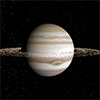 Because it's bigger, Jupiter ought to have larger, more spectacular rings than Saturn has. But new research shows Jupiter's massive moons prevent that vision from lighting up the night sky.
Because it's bigger, Jupiter ought to have larger, more spectacular rings than Saturn has. But new research shows Jupiter's massive moons prevent that vision from lighting up the night sky.
Jul 21st, 2022
Read more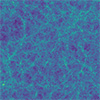 A neural network method machine-learning technique has enabled researchers to develop a very fast and highly efficient software program that can make theoretical predictions about structure formation in the universe.
A neural network method machine-learning technique has enabled researchers to develop a very fast and highly efficient software program that can make theoretical predictions about structure formation in the universe.
Jul 21st, 2022
Read more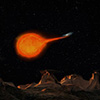 Astronomers suggest a new way of detecting dim bodies, including planets, orbiting exotic binary stars known as Cataclysmic Variables.
Astronomers suggest a new way of detecting dim bodies, including planets, orbiting exotic binary stars known as Cataclysmic Variables.
Jul 20th, 2022
Read more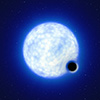 A team of international experts, renowned for debunking several black hole discoveries, have found a stellar-mass black hole in the Large Magellanic Cloud, a neighbour galaxy to our own.
A team of international experts, renowned for debunking several black hole discoveries, have found a stellar-mass black hole in the Large Magellanic Cloud, a neighbour galaxy to our own.
Jul 18th, 2022
Read more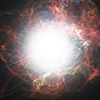 New work looks at using machine learning to decipher the early stages of supernovae explosions by reconstructing the light emitted during the outburst.
New work looks at using machine learning to decipher the early stages of supernovae explosions by reconstructing the light emitted during the outburst.
Jul 14th, 2022
Read more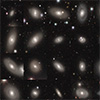 The discovery of 40,000 rare ring-shaped galaxies is six times more than previously known. Rings take billions of years to form and are destroyed in galaxy-galaxy collisions, and so this giant new sample will help reveal how isolated galaxies evolve.
The discovery of 40,000 rare ring-shaped galaxies is six times more than previously known. Rings take billions of years to form and are destroyed in galaxy-galaxy collisions, and so this giant new sample will help reveal how isolated galaxies evolve.
Jul 14th, 2022
Read more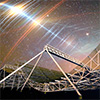 The clear and periodic pattern of fast radio bursts may originate from a distant neutron star.
The clear and periodic pattern of fast radio bursts may originate from a distant neutron star.
Jul 13th, 2022
Read more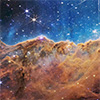 Nasa released the first science observations made by the suite of instruments carried on board the James Webb telescope, marking what we eagerly anticipate will be the beginning of a new era in astronomy.
Nasa released the first science observations made by the suite of instruments carried on board the James Webb telescope, marking what we eagerly anticipate will be the beginning of a new era in astronomy.
Jul 12th, 2022
Read more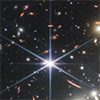 Webb's sharp near-infrared view brought out faint structures in extremely distant galaxies, offering the most detailed view of the early universe to date.
Webb's sharp near-infrared view brought out faint structures in extremely distant galaxies, offering the most detailed view of the early universe to date.
Jul 12th, 2022
Read more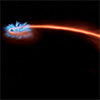 In 2019 tidal disruption, much of star's mass ended up in symmetrical cloud that hid black hole.
In 2019 tidal disruption, much of star's mass ended up in symmetrical cloud that hid black hole.
Jul 12th, 2022
Read more